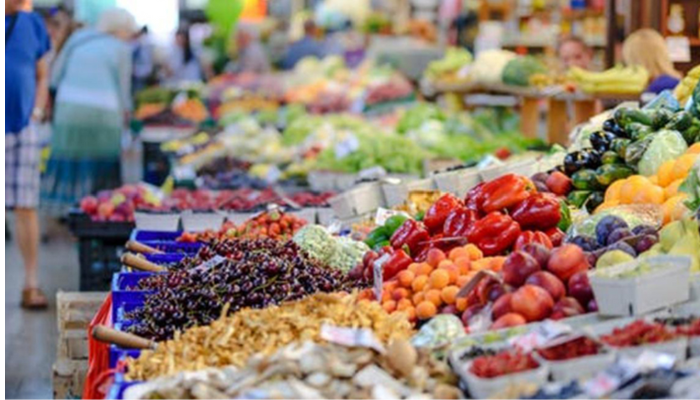Nigeria, a country in a constant state of economic flux, grapples with the ever-escalating specter of inflation, a pivotal determinant of the cost of living nationwide. As of the latest available data from October 2023, sourced from the National Bureau of Statistics (NBS), the inflation rate has surged to an 18-year high, clocking in at a staggering 27.33%. However, the ramifications of this soaring inflationary environment are distributed unevenly across the diverse states of the nation.
### Regional Disparities in Inflation Rates
#### Kwara State
At the base of the list is Kwara State, exhibiting the lowest inflation rate among the ten states listed, albeit at a concerning 28.2%. While an improvement over September’s 24.4%, the uptick signals a noteworthy escalation. Particularly striking is the high food inflation in Kwara, standing at 31.7%, underlining the substantial impact of food prices on the inflationary dynamics in the state.

#### Bayelsa State
Following closely is Bayelsa State, with an all-items inflation rate of 29.0%, marking a significant leap from the 21.0% recorded in the previous month. Despite this increase, Bayelsa boasts the lowest food inflation rate at 24.4%, suggesting a relatively milder impact on the food sector.
#### Ebonyi State
Next in line is Ebonyi State, registering an all-items inflation rate of 29.3%, a substantial rise from September’s 23.2%. The food inflation rate mirrors this upward trend, standing at 31.5%, signifying a noteworthy month-on-month escalation in the cost of living.
#### Abia State
Parallel to Ebonyi, Abia State also reports an inflation rate of 29.3%. However, the state distinguishes itself with a significant food inflation rate of 33.2%, surpassing the overall inflation rate and emphasizing the hefty cost of food within the state.
#### Ondo State
Ondo State presents a marginally improved scenario with an all-items inflation rate of 29.4%, holding steady from the previous month. The food inflation rate also remains constant at 27.7%, indicating a stable but persistently high cost for food items.
#### Akwa Ibom State
Midway on the list is Akwa Ibom, grappling with a 30.7% inflation rate. The high food inflation of 31.3% underscores the profound influence of food costs on the general increase in prices.
#### Oyo State
Oyo State emerges with an all-items inflation rate of 31.2%, higher than the national average. Notably, the food inflation rate is a staggering 37.0%, the highest among the states listed, signaling a substantial surge in food prices compared to the previous month.
#### Lagos State
Lagos, the bustling commercial hub of Nigeria, mirrors Oyo with an all-items inflation rate of 31.2%. While the food inflation here is 27.0%, slightly lower than Oyo’s, the incremental rise from September’s all-items rate of 26.1% indicates a steady climb in living costs.
#### Rivers State
Rivers State claims the position of the second most expensive state with an all-items inflation rate of 31.4%. The food inflation, although relatively lower at 29.3%, suggests a growing trend of increased living expenses, as evidenced by the jump from September’s 27.0% all-items inflation rate.
#### Kogi State
At the summit of the list is Kogi State, standing out as the most expensive state to reside in Nigeria, grappling with an all-items inflation rate of 34.2%. This represents a significant surge from the 28.5% reported in September. The identical food inflation rate of 34.2% underscores the pivotal role of escalating food prices in driving the overall inflation in Kogi.
### Global Perspectives on Inflation and Poverty
During the launch of the June 2023 edition of the Nigeria Development Update, the World Bank sounded an alarm regarding Nigeria’s inflation rates, attributing an estimated four million people falling into poverty between January and May 2023 to the soaring inflationary pressures. The global lender also cautioned that about 7.1 million poor Nigerians were at risk of further impoverishment if the Federal Government failed to implement compensatory measures or provide palliatives following the removal of fuel subsidies, a significant contributor to inflation.
### A Nationwide Predicament
This state-wise ranking vividly illustrates that while some states experience a more pronounced surge in the cost of living, the overarching trend of rising prices is a nationwide concern. Additionally, the consistent escalation in food prices acts as a common thread, underscoring the imperative need for interventions that can mitigate the impact of inflation on the average Nigerian.
### Strategic Considerations
Armed with these insights, stakeholders and policymakers are better equipped to strategize and implement targeted interventions to counteract inflationary pressures and alleviate the financial burden on citizens throughout the country. As the economic landscape continues to evolve, proactive measures are crucial to fostering economic resilience and ensuring sustainable development across the diverse regions of Nigeria. The intricate interplay between inflation, regional dynamics, and global economic trends demands nuanced and adaptable strategies to navigate the complexities of Nigeria’s economic climate.
Support InfoStride News' Credible Journalism: Only credible journalism can guarantee a fair, accountable and transparent society, including democracy and government. It involves a lot of efforts and money. We need your support. Click here to Donate
